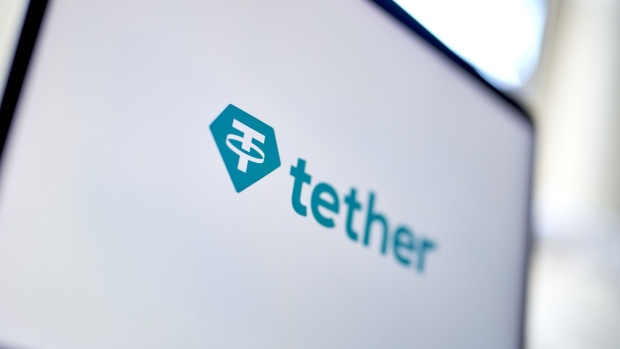Mar 28, 2024
US and UK Probe $20 Billion of Crypto Transfers to Russian Exchange
, Bloomberg News

(Bloomberg) -- The US and UK are reviewing more than $20 billion of cryptocurrency transactions that passed through a Russia-based virtual exchange, according to people familiar with the matter, as part of allied efforts to crack down on the sanctions evasion that’s supporting Vladimir Putin’s war in Ukraine.
The payments under scrutiny went through Moscow-based crypto exchange Garantex using the dollar-pegged cryptocurrency Tether, the people said, speaking on the condition of anonymity to discuss a matter that hasn’t yet been made public. The transfers have taken place since Garantex was sanctioned by the US and UK on suspicion of enabling financial crimes and illicit transactions in Russia, they said.
The inquiry shows the West’s continued struggle to decisively cut off the flow of money into Russia, despite building a sanctions regime far more sweeping than many observers thought was possible before Putin’s forces launched their full-scale invasion of Ukraine in February 2022. Russia has managed to stave off a widely predicted economic collapse by building a vast network of backdoors and work-arounds, including offshore oil transfers, technology exchanges via third countries and encrypted digital-currency transactions.
The Biden administration has been attempting to squeeze crypto exchanges like Garantex since the early days of the war. The $20 billion of transactions would represent one of the biggest breaches of the sanctions imposed on Russia since its start, the people said.
They also cautioned that the inquiries were ongoing and that it was too early to anticipate their conclusions given the complexity and opacity of cryptocurrency transactions. The people said there was no immediate suggestion of wrongdoing by Tether Holdings, which is incorporated in the British Virgin Islands, a British Overseas Territory.
Tether — a so-called stablecoin that aims to maintain a one-to-one value with the dollar — is the world’s most-traded cryptocurrency, with more than $100 billion worth of coin in circulation. Tether Holdings said in response to questions about the US-UK inquiry that it has frozen all the assets of entities with addresses on the US’s sanctions list.
“With Tether, every action is online, every transaction is traceable, every asset can be seized, and every criminal can be caught,” the company said in its statement. “We work with law enforcement to do exactly that.”
Garantex didn’t respond to a request for comment. The US Treasury, and both the UK’s Treasury and National Crime Agency declined to comment.
Earlier this month, Garantex said it seeks to prevent the use of the exchange for illicit activities and actively cooperated with European and US authorities until it was sanctioned. It said it still cooperates with other international law enforcement agencies and tries to steer clear of facilitating criminal activities.
Garantex was founded in 2019 in Estonia, though the US government has said most of its operations are now based out of Federation Tower in Moscow. Estonia stripped the exchange of its license to operate in the Baltic nation in February 2022 as the result of a coordinated effort with the US.
Read More: Cybercriminals Cash Out Ransoms at Moscow’s Tallest Tower
The US Treasury accused Garantex of allowing its systems to be “abused by illicit actors,” including by disregarding its anti-money laundering and anti-terrorist financing obligations, while announcing its own sanctions against the firm in April 2022. The US has linked Garantex transactions to more than $100 million of illicit activity, including those involving the Russia-based ransomware hacking group Conti.
Garantex says on its website that it allows withdrawals via Sberbank of Russia PJSC, Tinkoff Bank JSC and Alfa-Bank AO cards — Russian banks that have been sanctioned by the US and some of its allies. A photograph seen by Bloomberg shows a senior Garantex executive speaking on a panel at a recent event in Russia that appears to chart how to use crypto to access US dollars through a network of intermediaries.
In an indication of the US’s continued focus on Garantex, the Treasury added peer-to-peer virtual currency exchange Bitpapa to its list of sanctioned entities on Monday, citing connections with the firm.
While Tether helps investors swap between tokens and exchanges and shelter digital wealth from price swings, its anonymity, speed and stability have also made it popular with criminals. Once acquired on crypto exchanges and transferred to anonymous wallets, Tether can be sent anywhere instantly, without Tether Holdings knowing the identities of senders or receivers.
Read an excerpt from Zeke Faux’s book, “Number Go Up: Inside Crypto’s Wild Rise and Staggering Fall”
Tether is the most-used currency for online “pig butchering” investment scams, run out of giant compounds in southeast Asia, which have taken in billions of dollars from victims in the US, China, and around the world. Tether was the most-used stablecoin for criminal activity in crypto last year, according to an analysis by TRM Labs, which linked it to $19.3 billion of illicit transactions in 2023, compared with $24.7 billion the previous year.
Tether Holdings has denied knowingly facilitating crime and said it cooperates with law enforcement. The company earlier this month said it froze $1.4 million of Tether connected to a tech-support scam network to assist the US Justice Department and FBI.
--With assistance from Daniel Flatley, Zeke Faux and Emily Nicolle.
©2024 Bloomberg L.P.





